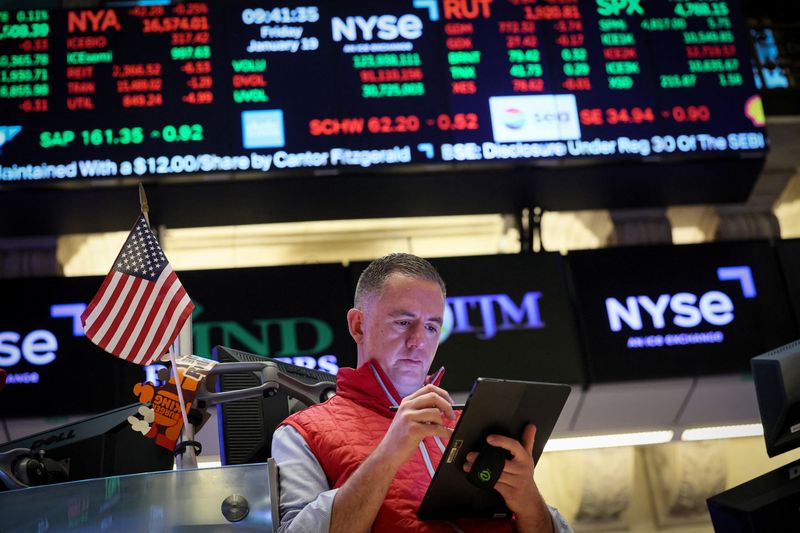By Lewis Krauskopf
NEW YORK (Reuters) -Hopes for lower interest rates and resilient growth in 2024 took the S&P 500 stock index to a record high on Friday, after two roller-coaster years featuring soaring inflation, tumult in the banking industry and economic unease.
The benchmark index ended on Friday at 4,839.81, which was above its prior closing high of 4,796.56 set on Jan 3, 2022. During the session it also set a record intraday high of 4,842.07.
The new closing record confirmed that the S&P 500 has been in a bull market since October 2022, by one widely used definition.
Stocks began wobbling in early 2022 on worries that surging consumer prices inflation would force the Fed to raise interest rates. The central bank’s monetary tightening cycle turned out to be its most aggressive in decades, boosting Treasury yields to 16-year highs and battering stocks.
The index slumped as much as 25% from its peak, hitting its bottom for the cycle in October of 2022. A sharp rally came in the latter months of 2023, as evidence that inflation was decisively cooling and a dovish message from the Fed helped drive stocks higher. The S&P 500 ended 2023 with a 24% increase, and has moved modestly higher in a bumpy start to 2024.
Surging shares of big technology companies and optimism over artificial intelligence - factors that have driven stocks higher for the past year - powered gains once more on Friday.
The interplay between stocks and Treasury yields has been a key driver of market moves over the last two years. Yields soared as the Fed began hiking interest rates to fight inflation and eventually hit a 16-year high in October 2023 as fiscal worries also exacerbated a selloff in U.S. government bonds.
Yields, which rise when bond prices fall, create investment competition to stocks while raising the cost of borrowing for companies and consumers.
Expectations for rate cuts in 2024 have pulled yields lower in recent months, with the benchmark 10-year Treasury yield recently at around 4.2% after breaching 5% in October. In recent weeks, however, yields have been creeping back up as investors recalibrate bets on how aggressively the Fed might move in the months ahead.
Another key factor powering stocks is the expectation that the Fed’s tighter monetary policy will be able to bring down inflation without badly hurting growth - the so-called soft landing scenario.
So far, the U.S. economy has proven resilient, with recent reports showing strength in areas such as retail sales and consumer sentiment.
Other measures, including the producer price index, have suggested a cooling trend. The Citigroup Economic Surprise Index, which measures how economic data performs versus expectations, turned negative in early 2024 for the first time since May.
"The Fed has a solid chance of bringing inflation back to target without triggering recession," Seema Shah, chief global strategist of Principal Asset Management, said in a recent commentary. "Make no mistake, it will still be a challenging policy landing."
Seven massive stocks drove the S&P 500’s gain last year, thanks to their outsized weighting in the index.
Shares of the so-called Magnificent Seven -- Apple (NASDAQ:AAPL), Microsoft (NASDAQ:MSFT), Alphabet (NASDAQ:GOOGL), Amazon (NASDAQ:AMZN), Nvidia, Meta Platforms and Tesla (NASDAQ:TSLA) -- surged between about 50% and 240% last year. Collectively, they account for about 28% of the S&P 500, and were responsible for nearly two-thirds of the index's total return last year.
Investors in BofA Global Research's latest fund manager survey named owning the Magnificent Seven as the market’s most “crowded” trade for the tenth straight month. Others said the sizeable rallies in these stocks have left them expensive compared to the rest of the market: the seven were trading this week trade at an average of about 33 times expected earnings, compared to 19.6 for the overall S&P 500.
"Even after the market-wide rally in December, market concentration in a handful of mega caps -- firms with ultra-large market capitalizations -- remains high," BlackRock (NYSE:BLK) strategists said in a recent note.

Valuations may be an obstacle for the broader market as well. The S&P 500's forward price-to-earnings ratio is now hovering near 20 times and is well above its historical average of 15.6 times, according to LSEG Datastream.
"While the bar was low last year for positive earnings surprises and market returns, it’s now a high bar this year given this starting valuation," Brent Schutte, chief investment officer at Northwestern Mutual Wealth Management Company, said in a commentary earlier this month.